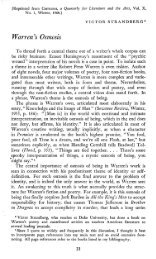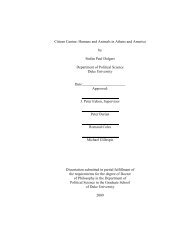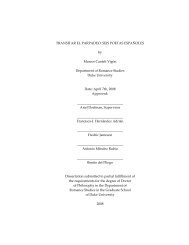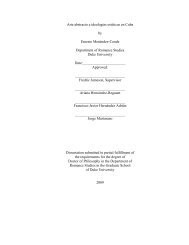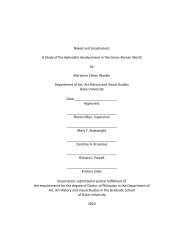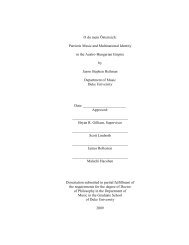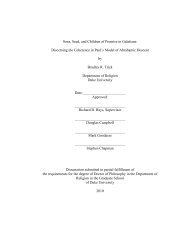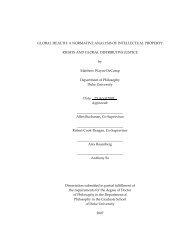View/Open - DukeSpace - Duke University
View/Open - DukeSpace - Duke University
View/Open - DukeSpace - Duke University
Create successful ePaper yourself
Turn your PDF publications into a flip-book with our unique Google optimized e-Paper software.
[Contemporary Scholarship on Homosexuality in Mainland China]<br />
Entering the 1990s, China witnessed dramatic changes in its popular culture with a surge<br />
a surge of queer novels, films, and art work propelled by the rise of electronic media and<br />
technology in everyday life (Berry et al. 2003; He 2008). At the same time, Western institutions<br />
such as Amnesty International and the World Health Organization began placing pressure on<br />
China’s government to adopt more liberalized attitudes towards sexuality (Huang 2009;<br />
IGLHRC 1999). The semi-public culture of gay bars, restaurants, and cruising zones, as well as<br />
the continued efforts of gay activists, has been prominent in Chinese popular culture (Wan 2001;<br />
Cui 2008). This tide of homosexual visibility across Chinese society prompted the scholarly<br />
world to pay greater attention to the tongzhi community (Berry et al. 2003; Sullivan 2001). 19<br />
Contemporary scholarship on homosexuality in China can be grouped into three different<br />
fields of study according to their order of emergence: 1) early works that explore the history of<br />
Chinese same-sex relations (e.g.: Lau and Ng 1989; Ng 1989; Samshasha 1997); 2) social<br />
science research that investigate China’s political position towards homosexuality (e.g.: Fang<br />
1995; Li 2006); and 3) literature on queer cultural products vis-à-vis China’s tongzhi movement<br />
(Chou 2001; Rofel 2007).<br />
I. Research on China’s History of Same-Sex Relations<br />
The earliest modern Chinese scholarly works on same-sex relations were written by<br />
intellectuals who labeled homosexuality as a psychological disease (Liu 1987, qtd. in Jackson<br />
and Sullivan 2001). 20 A key representation is The Sexual Life of Mankind (1934), written by<br />
19 Notably, Brokeback Mountain (2005) by Chinese director Ang Lee attracted significant attention when it was<br />
circulated on pirated DVDs and prompted people to pay attention to Comrade films and novels as well (Higgins<br />
2009; Jiang 2005).<br />
20 Scholars have speculated that after Western powers invaded and defeated China in the mid-nineteenth century,<br />
“progressive” Chinese intellectuals looked to Westernization as a mode for national advancement (Ruan 1988;<br />
Samshasha 1997). At this time, homosexuality was regarded as a mental disease in the West, and the Chinese<br />
Introduction | 16



